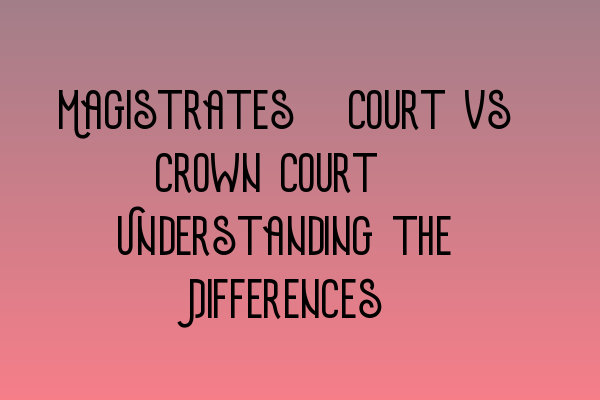Magistrates’ Court vs Crown Court: Understanding the Differences
When it comes to criminal law in the UK, there are two primary types of courts: Magistrates’ Court and Crown Court. Each court has its own jurisdiction and handles cases differently. Understanding the differences between these courts is essential to navigating the UK’s legal system effectively.
Magistrates’ Court
The Magistrates’ Court is the lower level court in the UK’s criminal justice system. It typically deals with less serious criminal offenses, such as minor assaults, drunk driving, and petty theft. Magistrates, who are volunteer judges, preside over the court proceedings. There are usually three magistrates, and they make decisions based on the evidence provided.
One advantage of the Magistrates’ Court is its speed. Cases are usually heard and resolved more quickly compared to Crown Court, which can be beneficial for defendants seeking a speedy trial. Additionally, the cost of legal representation may be lower in the Magistrates’ Court, as the complexity and duration of the cases are generally lower.
However, the Magistrates’ Court has limited sentencing powers. They can only sentence up to a maximum of 12 months’ imprisonment for a single offense, or 6 months’ imprisonment for multiple offenses. For more serious crimes, the case is usually sent to the Crown Court for trial and sentencing.
Crown Court
The Crown Court is the higher level court in the UK’s criminal justice system. It deals with more serious criminal offenses, such as murder, rape, and drug trafficking. Unlike the Magistrates’ Court, Crown Court proceedings are presided over by a professional judge. A jury of 12 members is also present to determine the guilt or innocence of the accused.
The Crown Court has broader sentencing powers compared to the Magistrates’ Court. If a defendant is found guilty, the judge can impose more severe penalties, including life imprisonment. The Crown Court also has the authority to issue fines and community service orders.
Trials in the Crown Court are typically longer and more complex than those in the Magistrates’ Court. They often involve multiple witnesses, expert testimonies, and extensive legal arguments. Consequently, legal representation in the Crown Court is usually more expensive.
Choosing the Right Court
Whether a case is heard in the Magistrates’ Court or the Crown Court depends on the seriousness of the offense and the decision of the prosecution. In some cases, the defendant may have the option to choose which court they prefer to be tried in, particularly if the offense falls within the jurisdiction of both courts.
It’s essential to seek legal advice to determine the appropriate court for your case. A qualified criminal defense solicitor can assess the circumstances, evaluate the potential outcomes, and guide you through the legal process.
For more information about the UK legal system, criminal law, and preparation for the SQE exams, check out the following related articles:
- SQE 1 Practice Exam Questions
- SQE 1 Practice Mocks FLK1 FLK2
- SQE 2 Preparation Courses
- SQE 1 Preparation Courses
- SRA SQE Exam Dates
At SQE Criminal Law & Practice Law UK, we provide comprehensive legal services and expert guidance for individuals facing criminal charges. Our team of experienced solicitors is well-versed in both Magistrates’ Court and Crown Court proceedings. Contact us today to discuss your case and receive the professional legal assistance you need.
